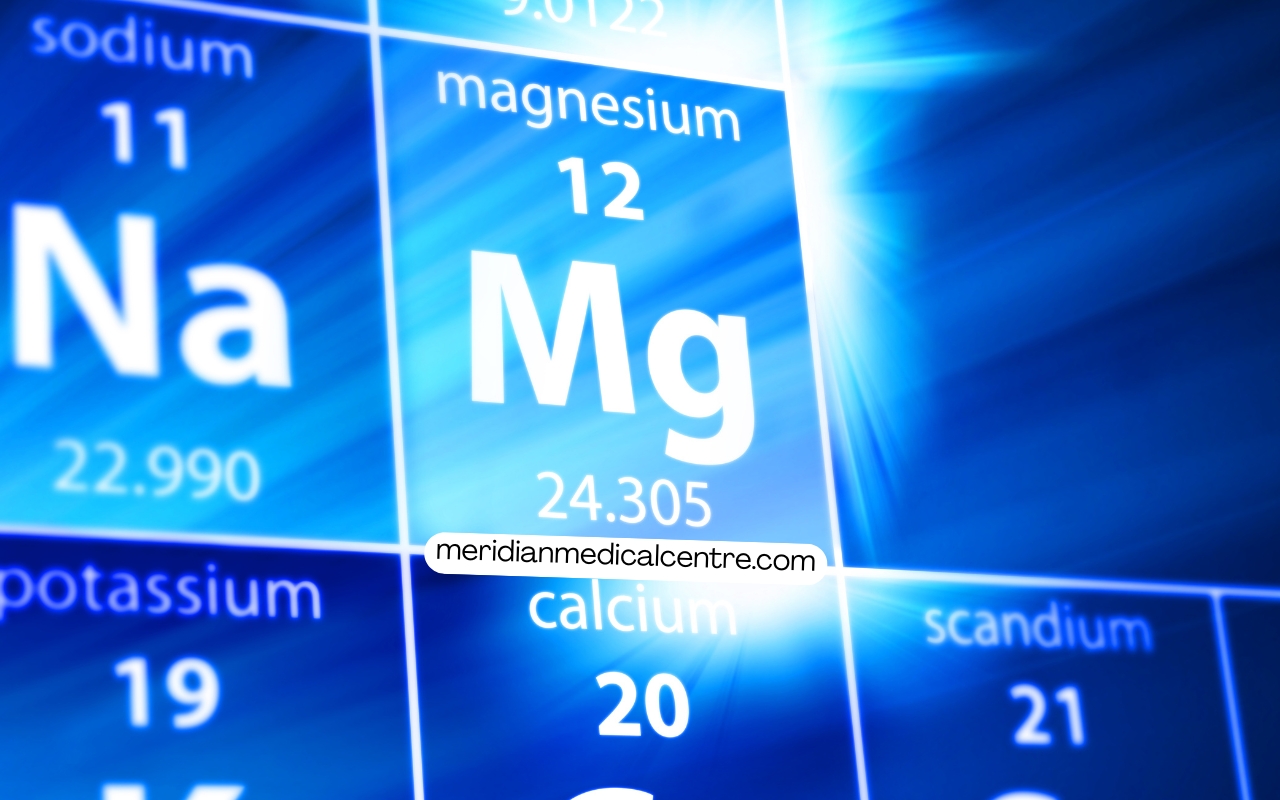
Magnesium is rapidly becoming one of the most discussed minerals in the world of wellness and preventive health. While it has long been recognized for its role in muscle and nerve function, new research highlights its broader impact on cardiovascular health, metabolic balance, mental well-being, and bone strength.
At MeridianMedicalCentre.com, we provide evidence-based, informative content on natural wellness approaches that complement conventional healthcare. This article takes a science-backed look at magnesium’s essential benefits, the risks of deficiency, and how to ensure optimal intake for overall well-being.
Why Magnesium Is a Critical Nutrient for Health
Magnesium is an essential mineral that supports over 300 enzymatic reactions in the body. Its key functions include:
- Regulating Blood Pressure: Magnesium helps relax blood vessels and support heart health.
- Maintaining Blood Sugar Balance: Plays a crucial role in insulin function and glucose metabolism.
- Supporting Brain Function & Mental Health: Helps regulate neurotransmitters that impact mood, stress response, and sleep quality.
- Reducing Inflammation: Supports immune function and helps lower markers associated with chronic diseases.
- Enhancing Bone & Muscle Health: Works in tandem with calcium and vitamin D to promote bone density and prevent muscle cramps.
Magnesium Deficiency: A Common Yet Overlooked Issue
Despite its importance, magnesium deficiency remains widespread. Studies estimate that nearly 50% of adults do not meet their daily magnesium needs. Several factors contribute to this deficiency, including:
- Diets Low in Magnesium: Processed foods lack sufficient magnesium, while modern agricultural methods have depleted soil magnesium levels.
- High-Stress Lifestyles: Chronic stress increases magnesium depletion, impacting overall health.
- Medication Use: Diuretics, proton pump inhibitors (PPIs), and certain antibiotics can interfere with magnesium absorption.
- Increased Physical Activity: Athletes and individuals who sweat excessively may experience higher magnesium loss.
Signs of Magnesium Deficiency
- Muscle cramps, spasms, or frequent tension
- Increased stress, anxiety, or difficulty sleeping
- High blood pressure or irregular heartbeats
- Low energy and frequent fatigue
- Poor concentration or cognitive fog
What the Research Says About Magnesium’s Health Benefits
1. Cardiovascular Health & Blood Pressure Regulation
A meta-analysis of 34 clinical studies published in Hypertension found that higher magnesium intake was linked to lower blood pressure. Research also suggests that magnesium helps reduce arterial stiffness and supports overall heart health.
2. Blood Sugar Regulation & Type 2 Diabetes Prevention
A study in Diabetes Care found that people with higher magnesium intake had a 47% lower risk of developing type 2 diabetes. Magnesium plays a key role in insulin sensitivity, making it essential for metabolic health.
3. Brain Health & Mental Well-Being
A randomized controlled study in Nutrients found that daily magnesium supplementation significantly reduced symptoms of anxiety and improved sleep quality within six weeks. Magnesium’s role in neurotransmitter function may help manage stress and enhance cognitive performance.
4. Bone Density & Osteoporosis Prevention
Research in The Journal of Bone and Mineral Research found that women with higher magnesium intake had a 27% lower risk of osteoporosis. Magnesium helps regulate calcium metabolism, making it essential for bone health.
Magnesium-Rich Foods for a Balanced Diet
The best way to ensure adequate magnesium intake is through whole foods. Some of the top sources include:
- Leafy greens (spinach, kale, Swiss chard)
- Nuts and seeds (almonds, pumpkin seeds, cashews)
- Whole grains (quinoa, brown rice, oats)
- Legumes (black beans, lentils, chickpeas)
- Fatty fish (salmon, mackerel)
- Dark chocolate (at least 70% cacao)
Should You Take a Magnesium Supplement?
For individuals struggling to meet their magnesium needs through diet alone, supplementation can be beneficial. However, different forms of magnesium provide distinct advantages:
- Magnesium Glycinate: Best for stress reduction, sleep support, and muscle relaxation.
- Magnesium Citrate: Highly absorbable and beneficial for digestion and hydration.
- Magnesium Malate: Supports energy production and reduces muscle fatigue.
- Magnesium Taurate: Recommended for cardiovascular health and blood pressure regulation.
- Magnesium L-Threonate: Known for its cognitive benefits and neurological support.
How to Optimize Magnesium Intake for Long-Term Health
- Prioritize Whole Foods: A balanced diet rich in magnesium can naturally support overall health.
- Monitor Intake: The recommended daily intake is 400-420 mg for men and 310-320 mg for women.
- Manage Stress & Sleep: High-stress levels deplete magnesium, making relaxation techniques and quality sleep essential.
- Stay Hydrated: Magnesium works alongside other electrolytes to maintain hydration and muscle function.
- Use Supplements When Needed: Choose a form of magnesium tailored to your specific health needs and consult with a healthcare provider for guidance.
Final Thoughts: Why Magnesium Deserves a Spot in Your Wellness Plan
The growing body of research on magnesium underscores its role as a key player in overall well-being. Whether it’s heart health, metabolic balance, or stress management, ensuring adequate magnesium intake is one of the simplest ways to enhance longevity and quality of life.
At MeridianMedicalCentre.com, we provide evidence-based insights to help individuals integrate natural and clinical wellness solutions for better health outcomes. Magnesium is an essential mineral that should not be overlooked—whether through diet or supplementation, optimizing magnesium intake is a powerful step toward a healthier future. If you’re considering supplementation, consult a healthcare professional to tailor a plan that best suits your needs.